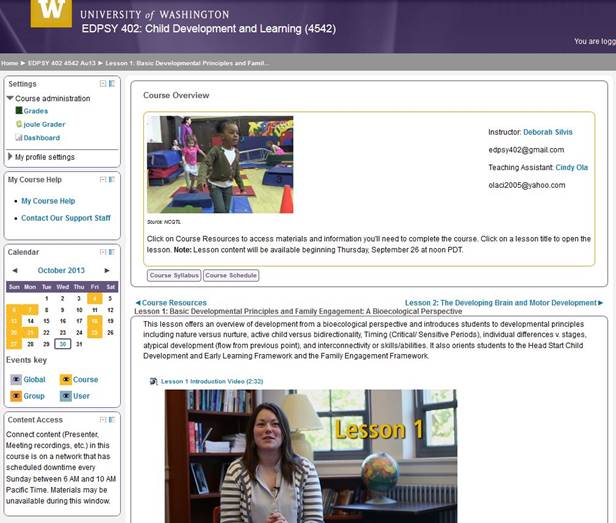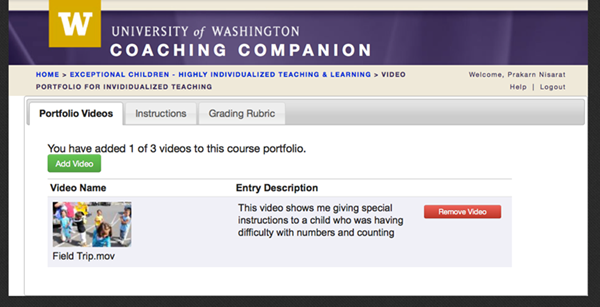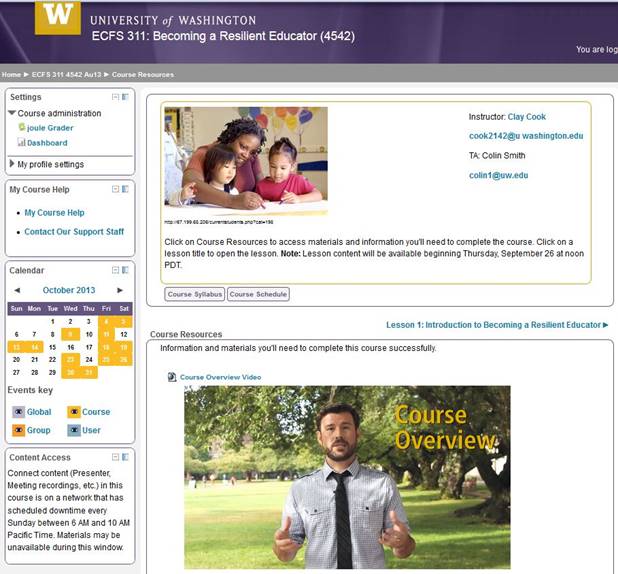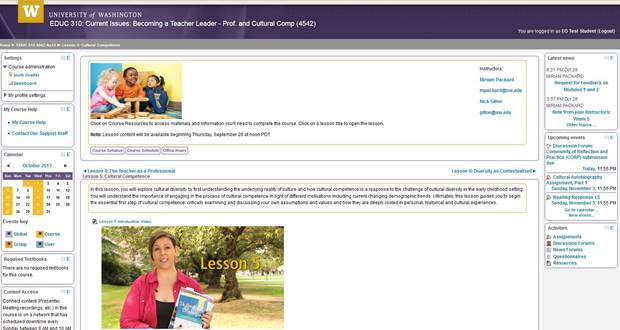Key Takeaways
- By extending cutting-edge research and resources to online students in the high-demand field of early childhood education, the University of Washington paves the way for additional degree completion programs.
- Courses maximize peer interaction and build an online learning community, requiring students to progress with each class at the group's pace.
- Students are also supported by a dedicated academic advisor, tech and online support teams, a retention analytics specialist, and a part-time staff member in the writing center.
David Szatmary is vice provost, University of Washington Educational Outreach. Tom Stritikus is dean and Gail E. Joseph is director, Early Childhood & Family Studies program, University of Washington College of Education.
In autumn 2013 the University of Washington (UW) launched its first UW Undergraduate Online Degree Completion program (figure 1 shows the home page), a Bachelor of Arts in Early Childhood and Family Studies (ECFS). This new degree is offered by the UW College of Education in close collaboration with UW Educational Outreach [http://www.outreach.washington.edu/uweo/] (UWEO), which offers diverse fee-based programs for multiple audiences under UW Professional & Continuing Education (UWPCE). Initially supported in part with development funds from a wave IIIb Next Generation Learning Challenges (NGLC) grant from EDUCAUSE, the program represents a major degree completion milestone for the university. By extending cutting-edge research and resources to online students in the high-demand field of early childhood education, the UW paves the way for additional degree completion programs, using new technologies and innovations in online learning and pedagogy.

Figure 1. Home page for the UW Undergraduate Online Degree Completion program
Addressing Barriers to Degree Completion: Cost, Flexibility, and Institutional Approvals
The online degree completion program in ECFS is based on (and closely affiliated with) a preexisting onsite bachelor's degree program within the College of Education. The online version broadens program access to serve the needs of early childhood education providers, many of whom may lack a four-year degree and work long hours for modest salaries. Additionally, many are parents with complex schedules.
This important field has a critical need for high-quality education. In a flexible and more affordable online format, the new degree addresses common barriers to higher education for the early childhood care and education community, including cost, access, flexibility, relevance, and effectiveness. Reducing these barriers makes it easier to equip early childhood professionals with the education and skills needed to improve school readiness and learning outcomes for our nation's young children.
The online degree features a rigorous curriculum enriched by research-based best practices through collaboration with the National Center on Quality Teaching and Learning (NCQTL) located at the University of Washington, led by a team that includes the ECFS online degree director. The NCQTL is one of five National Technical Assistance and Training Centers funded by the Office of Head Start.
Using Moodle as a learning management system and the latest online and video technologies, the flexible online degree encourages meaningful and relevant integration of coursework with practice sessions, embracing performance-based assessments. Students not only gain knowledge but also demonstrate learning through video recordings and examining their practice with peers to seek observable, quantifiable improvements. Online courses are instructor-facilitated and designed to maximize flexibility by allowing students to log on and conduct activities at times of their choice. Courses maximize peer interaction and build an online learning community, requiring students to progress with each class at the group's pace.
The UW offers this online degree completion program at the lower rate of $160 per credit for the 2013–14 academic year, regardless of residence. By comparison, in-state undergraduate tuition for the related onsite degree costs nearly $400 per credit, totaling more than $12,000 per year for tuition for in-state students and nearly $32,000 for out-of-state students.1 Students are eligible to receive federal financial aid and other loans and grants from various sources, for both online and onsite programs.
Figure 2 shows a screenshot from an ECFS online course. It provides a glimpse of the learning environment and user interface.

Figure 2. Overview screen from an ECFS online course
Implementing online degree completion in a well-established traditional system at a major public university required a number of approvals. The ECFS development team ushered the online degree proposal through extensive reviews and approvals by committees at both the college and institutional levels, and through a multi-campus review. The proposal first received approval from the College Council in the College of Education and the faculty in the college. Then, the Faculty Council on Academic Standards reviewed and approved the initiative. In addition to several general faculty discussions about the proposal, both the president and provost of the University of Washington approved the online degree. Finally, a Tri-Campus Committee ensured that all three UW campuses approved the initiative. This complex process took considerable time and effort, affecting multiple teams over several months.
In addition, special care was taken to ensure the new degree completion model would be appropriately integrated with essential processes such as financial aid, library and information systems, student services, disability services, student fiscal services, admissions, and student records. One valuable lesson learned is that this approval stage can be time consuming, and it includes unpredictable elements outside the control of the program's interdepartmental team. We were challenged by the brief time windows between multiple approval stages and the looming target start date. Ample allocation of time, with buy-in from leadership, key stakeholders, and decision makers is vital to successfully approve, design, build, launch, and market such a new program, especially when online degree completion is new to the institution.
Guiding Students through Academic Reentry
The new ECFS program was proposed to increase access for adults who have not had the opportunity to complete their undergraduate degree. Recognizing the needs of adults with busy lives returning to college, the program correctly anticipated an audience that requires help to navigate reentry into a university system. For the first cohort, most applicants and 100 percent of the enrollees used the program's dedicated advising services.
For this launch, three distinct entities worked collaboratively to provide necessary student advising services. The UWPCE enrollment advising team provided first contact for potential applicants, answering general and administrative questions about the program. The team then elevated inquiries to an academic advisor at the College of Education or an admission specialist at the Admissions Office, as needed.
The program requires applicants to have 70 transferable quarter credits and to fulfill specific coursework in high school or community college (College Academic Distribution Requirements, or CADRs). In addition, applicants must fulfill prerequisite course work for the ECFS major. Normally, students apply to the UW first and, once accepted, they apply for acceptance into a major. For the ECFS online degree completion program, the Office of Admissions partnered with the College of Education and UWPCE to create an integrated, streamlined application process. This simplified process allows students to be accepted to the UW directly into the ECFS major (and this major only), eliminating duplicative steps in submitting documents and forms.
In spite of a simplified admissions process, the implementation team and applicants encountered challenges due to interface issues with the existing UW system and program requirements for this audience. For example, applicants were required to submit high school transcripts to verify they completed their CADR courses; however, these transcripts were not always readily available, particularly for relatively older adults. Additionally, some CADR requirements, especially foreign language and math, proved to be a common deficiency among applicants. Another challenge is that the UW does not accept transfer credits from vocational coursework, including related courses specific to Associate of Applied Science and Associate of Technical Arts programs in Early Childhood Education.
As we continue online degree completion discussions, it will be necessary to optimize processes for this audience, while keeping essential elements to ensure appropriate qualification and admission of applicants. For scaling up online degree completion programs to larger cohorts and new degrees, we've learned it is crucial to maximize advising resources to help applicants with academic reentry. Aligning requirements for the intended audience is also advisable.
Performance Assessment and Technology Challenges
The ECFS online curriculum is built and delivered using a "Know, See, Do, Reflect, Improve" framework to maximize learning and practice. Small projects, service learning courses, and a capstone e-portfolio are components in which students demonstrate abilities to apply what they have learned and receive feedback for improvement. Videos are the primary medium for students to record their activities and provide peer reviews. This assessment is the backbone of student evaluation and grading for ECFS students; it is also a strong factor in increasing relevance of the program and eliminates the need for proctored exams.
For video, the program implementation team was required to test, recommend, and prepare to support a video recording package that is affordable and appropriate for intended uses by students. The team resolved video storage and file issues to ensure compliance with FERPA and data security, while providing user-friendly access to participants. The online degree uses MediaAMP and also Coaching Companion (figure 3),2 UW-developed video software, to facilitate video-based activities.

Figure 3. Sample screen from Coaching Companion
Ample technical support was allocated to help students, especially during the first two weeks of the program. Initial technology challenges for students thankfully proved to be slight. There were a few Adobe Connect errors as students logged in for occasional synchronous, real-time activities during the orientation period, a few late registrations requiring manual additions to Moodle, some simple browser problems, initial issues with viewing course materials on Macs, etc. Most concerns were resolved in one or two brief contacts with tech support.
Features to Promote Retention and Success
The ECFS program launched with design features to promote retention and completion, but will benefit from additional components still being developed as we leverage knowledge about the effects of non-cognitive factors in student success.
The online curriculum features two courses specially designed to equip students with the core competencies, strategies, and tools to persist and succeed throughout the program: Becoming a Resilient Educator, and Becoming a Teacher Leader: Professional & Cultural Competency. Figures 4 and 5 show screenshots from each course.

Figure 4. Sample screen from Becoming a Resilient Educator

Figure 5. Sample screen from Becoming a Teacher Leader
By participating in the Becoming a Resilient Educator course, students learn to strive to be as mentally and psychically healthy as possible: to build confidence, to effectively manage stressful situations, to connect well with and understand the needs of others including young children and their parents, and to focus on positive and fulfilling aspects of life. This course will also be offered as a MOOC (massive open online course) to introduce a global audience to the ECFS online program, to extend to anyone the benefits of developing resiliency and mindfulness skills, and to increase participants' success as learners and educators. This MOOC is tentatively scheduled to launch on edX in summer2014 after the spring launch of another ECFS class on a MOOC.
In the Becoming a Teacher Leader course students learn how to use technologies such as video capturing, editing, and sharing as effective professional development tools, in addition to learning leadership skills. These are the same technologies used throughout the program. In this early course the instructor eases students into video use, with a support team poised to supply additional guidance and technical help. We predict this will provide good return on investment, avoiding future interventions and frustration as students adapt to the online learning environment.
In addition to these features, the program has a cohort-based structure to build community and peer support. Students are also supported by a dedicated academic advisor, tech and online support teams, a retention analytics specialist, and a part-time staff member in the writing center.
As UW online degree completion scales up to include additional majors over time, the team will review elements that promote retention and success. They will capitalize on resources, ideas, and insights exchanged as part of the discourse among educators involved in NGLC projects. In particular, the team will watch for non-cognitive factors and related support models such as the Academy for College Excellence model and explore potential collaborations when appropriate.
Analytics: Metrics Tell the Story
The ECFS program has created a foundation to use predictive and outcome analytics to support student retention and success. However, we expect more investment of time and resources will be needed as the program grows and other degrees are considered.
The program team includes a faculty member from the College of Education who is a leading expert on educational analytics to help design, implement, and report best-practice metrics for online education. He will also help the team automate data collection and mining and highlight learning areas that may need enhancement, repetition, or alternative strategies. The program has also hired a Retention Analytics Specialist, who will use learning analytics tools to detect students who might be at risk. The Analytics Specialist will communicate with faculty, service units, and staff regarding students who are experiencing difficulties and assist in targeting solutions and strategies for student completion and success. Finally, the program has formed a multi-departmental evaluation and assessment group that meets regularly to identify evaluation questions, strategies, and metrics including those related to student retention and success.
As online degree completion grows, the vision is to use analytics to support student retention and success throughout the continuum of student experience. From connecting with the intended audience through enrollment, assessing progress toward degree, academic success within each course, and behavioral issues, the collected data will be used to help shape this program, provide student interventions, and build future programs. The team is aware that special attention should be paid to student interventions and the importance of psychological factors including timing, tone, delivery medium, format, and frequency. The team also values new insights and ideas exchanged among members of the NGLC learning community and others.
At this early stage, analytics have so far been of most value for connecting with the target audience, through efforts of UWPCE's marketing department. Data collection through the program's website, phone inquiries, and customer relationship management (CRM) system allowed the team to capture levels of interest, geographic locations of potential applicants, and details of high interest, and to determine how to allocate resources to best guide students through reentry to a baccalaureate degree.
The Launch: Reaching the Audience
Along with data collection on prospective students, the marketing department's outreach to pre-schools, childcare sites, and early education centers reached target students, building the first cohort in spite of the brief window between approval and launch of the new program. Information packets featured compelling graphics along with content that spoke to the audience about the need for improved childhood education (figure 6).

Figure 6. Marketing for the new online BA program
In alignment with marketing efforts, a public relations campaign created internal and external awareness as the website launched. Online degree completion in ECFS was announced by the UW president, the College of Education, and a state-level expert in early childhood education, in a press conference held at a nearby childcare facility to maximize visuals for the press. Target media were pitched and received the press release. The event was timed to coincide with the state's legislative session to increase awareness at the advocacy level. This facilitated several media placements and built excitement for the new initiative.
Partnerships with Community Colleges
The UW Undergraduate Online Degree Completion program has established academic pipeline and reverse transfer partnerships with community colleges such as Shoreline Community College, the Seattle Community Colleges, and Rio Salado College. The program may consider additional partnerships as online degree completion grows.
These alignments present positive arrangements that offer guidance to students who wish to complete the UW's required general education courses at the community college level. Program academic advisers and a UW community college partnership specialist work with the colleges to maximize alignment for the student's course of study. In some cases, students may be able to earn an associate's degree while completing the UW bachelor's program.
The UW will continue to strategically consider these partnerships, reaching out to colleges with high percentages of under-represented groups in areas where opportunities to complete an undergraduate degree might be limited.
Forward from Here: More Completion Degrees, More Students
As the pilot online degree completion program for the UW begins, the ECFS team and first cohort of 54 students are blazing trails for future cohorts and additional, larger programs. Not surprisingly, the initial cohort includes students ranging in age from 19 to 59 years old, with 37 percent being 35 or older. While 81 percent are from Washington State, 19 percent come from around the country.
The UW is currently reviewing the next online degree completion program in Integrated Social Sciences, now in the final stages of the approval process. This second degree will again require significant cross-team partnerships, this time between UWPCE and academic partners in the UW College of Arts & Sciences. The Social Sciences completion program is expected to obtain approval and attract significant numbers of students, further addressing the widely established need to help adults finish a general undergraduate education. As with the ECFS degree, a principal goal will be to offer a lower-cost, more affordable program to reach those who might not otherwise be able to complete their degree.
- Tuition figures are complex, with different fees included depending on how they are defined. Cost is broken down here to show comparative "per credit" rates.
- This image of Coaching Companion is pulled from slide 15 of a March 26, 2013, presentation by Elaine Joseph (a co-author of this article), "Improving preparation of early learning providers at UW."
© 2014 David Szatmary, Tom Stritikus, and Gail E. Joseph. The text of this EDUCAUSE Review Online article is licensed under the Creative Commons Attribution-Noncommercial-No derivative works 4.0 license.
